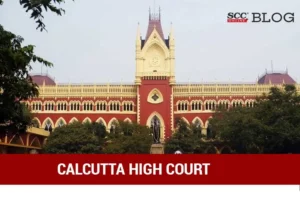Calcutta High Court: In a writ petition challenging the provisional attachment order under Section 83 of the Central Goods and Services Tax Act, 2017 (CGST Act), a single-judge bench comprising of Md. Nizamuddin,* J., dismissed the writ petition, finding no merit in challenging the legality of the provisional attachment. The Court emphasised the compliance with Rule 159(5) of CGST Rules and the absence of any challenge to the attachment within the specified remedy period.
Factual Matrix
In the instant matter, the petitioner, a partnership firm registered under GST in Kolkata, challenged the provisional attachment order dated 22-03-2023, issued under Section 83 of the CGST Act, by the Additional Director General, DGGI, Guwahati, attaching the bank account of petitioner 1 maintained with HDFC Bank Ltd., Kolkata. The petitioner challenged the provisional attachment on the grounds of lacking conditions precedent, improper format, and non-disclosure of pending proceedings. Allegations include the attachment being made without any pending proceedings under relevant GST chapters and without adherence to prescribed forms. The petitioner contended that the jurisdictional Commissioner did not issue the attachment order in the prescribed format (GST DRC-22) and failed to provide a copy to the Registered Taxable Person (RTP).
Moot Point
-
Whether the Court has territorial jurisdiction under Article 226 to entertain the writ petition challenging the provisional attachment order issued by DGGI, Guwahati, concerning a registered person in Kolkata?
-
Whether DGGI, Guwahati, has jurisdiction to invoke Section 83 for provisional attachment without the initiation or pendency of proceedings against the petitioner, based on the involvement of one of its partners in other entities?
-
Whether the impugned provisional attachment order complies with Section 122(1), 122(1A) of the CGST Act, and Rule 159(5) of the CGST Rules, 2017?
Petitioner’s Contentions
The petitioner contended that the impugned order lacked the required format under Rule 159(1) of CGST Rules. It was contended that the jurisdictional Commissioner failed to disclose any pending proceedings as required by GST DRC-22. It was contended that the impugned order is non est in law, lacking details specified in GST DRC-22, and the petitioner is not treated as a person specified in Section 122(1A) of the CGST Act. It was further contended that the Guwahati Zonal Unit lacks territorial jurisdiction over the petitioner under Kolkata Commissionerate. The petitioner lastly contended that the writ petition is maintainable as a fraction of the cause of action occurred within the state.
Respondent’s Contentions
The respondent contended that the impugned order is legal and valid, protecting the government’s revenue interest. It was contended that the DGGI has pan-India jurisdiction and authority to attach property, including bank accounts. It was asserted that the attachment is based on tangible material indicating the petitioner’s involvement in availing ineligible input tax credit and passing on fake input credit. It was further contended that no separate permission is required for DGGI officers to investigate taxpayers outside their zone and the Form GST DRC-22 has been issued in accordance with the law.
Court’s Decision
The Court found the writ petition maintainable based on the presence of a portion of the cause of action within its territorial jurisdiction. The Court upheld the jurisdiction of DGGI, Guwahati, based on findings during the investigation and concludes that the petitioner failed to comply with Rule 159(5) by not filing objections. The Court rejects the petitioner’s arguments regarding the lack of conditions precedent and improper format, ruling that the provisional attachment order was legal, valid, and within jurisdiction.
The Court held that the impugned order is deemed legal, valid, and within jurisdiction, considering the provisions of the CGST Act, relevant circulars, notifications, and the materials found against the petitioner during investigation. The Court dismissed the writ petition, affirming the legality and validity of the provisional attachment order, with no order as to costs.
[Arramva Corpn. v. Addl. Director General, 2023 SCC OnLine Cal 5749, order dated 21-12-2023]
*Judgment by Justice Md. Nizamuddin
Advocates who appeared in this case :
Mr. A. Majumder, Sr. Adv., Mr. D.N. Sharma, Mr. Saurabh Bagaria, Mr. Sailendra Jain, Mr. Saumya Kejriwal, Counsel for the Petitioners
Mr. Amitava Mitra, Ms. Antara Choudhury, Counsel for the Respondent 6
Mr. K.K. Maiti, Adv. Mr. Tapan Bhanja, Counsel for the CGST authorities
Mr. Anirban Ray, Ld. Govt. Pleader, Mr. Md. T.M. Siddiqui, Mr. T. Chakraborty, Mr. S. Sanyal, Counsel for the State
Mr. Smita Das De, Counsel for the Union of India

